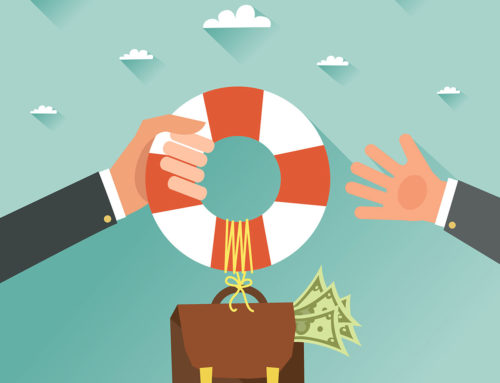When the PowerBall jackpot recently grew to over $1.6 billion dollars, a lot of people ran to their nearest gas station, deli, or convenience store to buy a ticket. For the few people who came out with the lucky numbers, their lives will be changed forever. But for the rest of us, life just goes back to normal – until the jackpot grows large enough to capture our attention again and we buy tickets. But what are the actual odds behind winning, and the statistics and facts about our chances to hit a big payday playing the lottery?
Here are 25 facts about hitting the big lottery jackpot:
1. The odds of someone winning the Mega Millions jackpot are around 1 in 292.2 million (almost the entire population of the United States!)
2. Top put that in perspective, you are about 60 times more likely to die from a bee sting or 75 times more likely to be hit by a lightning bolt than win the lottery. Or, the odds of you hitting the lottery at 292 million to 1 are the same as if you flipped a coin and got heads 28 times in a row.
3. Despite those long odds, the average US household spends $162 per year on playing the lottery.
4. But people who make less than $10,000 a year spend an average of $597 annually on lottery tickets.
5. And households earning less than $13,000 a year spend about 9 percent of their total income on lottery tickets!
6. It’s a fact that low-earning households and people living below the poverty line play the lottery at a much higher rate than everyone else.
7. The state lottery offices know this, and actual target the poor with their lottery ads. States not only know this; they actually target the poor with lottery ads.
8. Rhode Island leads the nation in average spending on lottery tickets ($793.24 per) while South Dakota, Massachusetts, West Virginia, Delaware, New York, Georgia, Maryland, and New Jersey round out the top 10.
9. What do lottery winners purchase when they win? The typical lottery winner buys an average of 4.5 brand new cars for themselves and their family and friends once they win. An astounding 10 percent of lottery winners purchase 10 cars or more!
10. While we hear of many high profile lottery winning cases, the vast majority go anonymous. In fact, 85 percent of lottery winners collect their money but don’t go public with the windfall.
11. Despite those long odds, one prominent economist actually called playing the Mega Millions “a good bet.” Economist Stephen Bronars blogged that after careful calculations, including the odds of winning, the chances of splitting the prize with others, taking out taxes, the chance of winning smaller payouts, etc., the Mega Millions was a good bet because the expected value of a $1 ticket was $1.23.
12. When a jackpot prize grows to massive proportions, it attracts an exponentially larger number of players. But is playing a bigger jackpot a smart bet? In fact, the Wall Street Journal reported on a computer scientist who did the calculations and found that “higher jackpots actually yield lower expected payouts, as the odds of having multiple winners rise.”
13. The WSJ reported that statistically, you have the best odds of winning when the prize hits $420 million. But even then, the expected value of a $1 ticket only stands at 69¢. – a losing proposition.
14. The $949.8 million Powerball jackpot is the largest lottery payout ever in the United States
15. The previous biggest lottery jackpot was a $656.0 million Mega Millions payout on March 30, 2012, split between three winning tickets in Illinois, Kansas, and Maryland.
16. But even our current $949.9 million Powerball lottery is not the biggest in the world. In fact, it can be called chump change compared to Spain’s huge Sorteo Extraordinario de Navidad Christmas lottery, known as “El Gordo” (The Fat One). The world’s biggest lottery, El Gordo paid out $2.4 billion dollars across Spain in millions of prizes in just one month!
17. Typically, an average of $8,700 is spent every minute on lottery tickets, games, and scratchers…in each state! But when the PowerBall and other lotteries reach such epic proportions, it’s not uncommon to see lottery tickets sold nationally at the rate of 130,000 every minute nationally leading up to the prize!
18. When you win the lottery, you are given two options: take a lesser lump sum all at once and up front, or take the full amount but receive it in an annuity every week or month for the rest of your life.
19. So IF you’re lucky enough to win the lottery one day, which option should you take? Statistically, a lump sum payout makes more sense because of the time value of money. That means even though you get a far lesser amount today, investing it correctly for a steady rate of return will yield exponentially bigger dividends over time.
20. However, factoring in the human element and the typical financial mismanagement of the average lottery winner (buying luxury items like mansions, cars, vacations, shopping sprees, partying, etc. instead of investing), you are far better off taking the monthly annuity as a safety net against overspending.
21. Uncle Sam loves it when you hit the jackpot, too. That’s because approximately half of your lottery winnings will go to the government in federal and state taxes, before you even see a penny.
22. While the odds are extremely slim that you win millions of dollars, there are far more winners of smaller payouts for getting most – but not all – of the numbers right. Statisticians and mathematicians crunched the numbers, and buying more tickets does increase your odds of winning at least something (no surprise there). In fact, when you buy 9 tickets, you’re estimated to win at least one prize 25% of the time
At 13 tickets, you’re estimated to win at least one prize 33% of the time
At 22 tickets, you’re estimated to win at least one prize 50% of the time
At 44 tickets, you’re estimated to win at least one prize 75% of the time
At 73 tickets, you’re estimated to win at least one prize 90% of the time
At 95 tickets, you’re estimated to win at least one prize 95% of the time
You’ll need to buy 145 tickets to be 99% sure that you have at least one winning entry.
The bad news? Some of those winning combinations will only yield you a $4 prize, so even a winner doesn’t guarantee you recover your investment in lottery tickets.
23. Are there any other ways to increase your chances of winning? The laws of probabilities give us some help here. For instance, you shouldn’t pick consecutive numbers when choosing your 5 lottery numbers, as the odds of 5 consecutive numbers landing as winners is astronomically rare. The same goes for picking numbers that all end in the same digit (8, 28, 48, etc.).
24. Remember that you’re not just playing to win, but competing against all other lottery players, who may beat you by choosing “your” numbers. So playing against common tendencies is a legitimate way of increasing your odds. For instance, people often choose their numbers based on their birthday or the birthdays of loved ones. So picking numbers above 12 and 31 (months and days) helps your odds. In fact, when picking 5 numbers, 70% of the time the winning numbers total between 104 and 176!
25. As the PowerBall and other big lottery payouts grow to jaw dropping sums, the number of players shoots way up. So your odds are actually greatly diminished the bigger the lottery payout. If you wanted to bet the stats, skip the huge paydays and play the smaller ones instead. This is the same for lesser known and less popular lotteries and playing at off times (not around Christmas and New Years, etc.).
Are you still going to buy a lottery ticket? Good luck, and don’t forget who tried to help you if you win!
Look for part two of this blog, where we recount the most amazing lottery facts, trivia, and stories from lottery winners (many of whom quickly turned into losers!)



